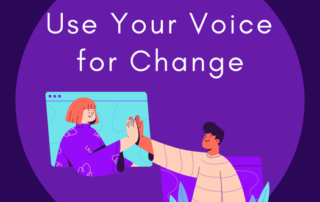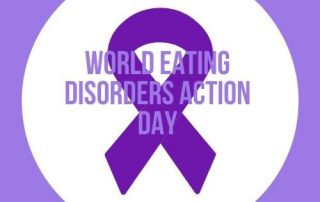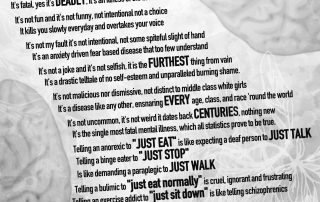Who is at risk of developing an eating disorder?
Anybody can be at risk. The doctors say that 80 per cent is genetics, which loads the gun, and 20 per cent is the environment, which pulls the trigger. If you are predisposed, you can end up being a drug addict or abusing alcohol, or end up with an eating disorder. As Jews, we take care of others who are struggling and cannot help themselves, and who certainly do not choose to live this way.
Statistics indicate that one in 10 people suffering from an eating disorder will die. What are the health consequences of an eating disorder?
Eating disorders are serious mental illnesses associated with significant medical complications that affect every organ of the body. My daughter has osteoporosis in her spine, because of the starving and lack of nutrition. Amy’s iron levels, growth, menstrual cycles and electrolytes are out of balance. There have been frequent visits to the emergency room for fainting.
What is the treatment for eating disorders?
If people are medically unstable, they need to be hospitalized. Once they are medically stable, there are different methods therapists will use, such as dialectical behavioural therapy and family based therapy. There are only 20 residential beds in all of Ontario for anyone over the age of 18. There is no funded residential treatment
centres for adults like there are in the United States, the U.K. and Australia. The goal is to nourish the person so the brain can start functioning again, but it becomes a revolving door, because there are not enough resources to work on an individual basis. Once they are medically stabilized, they need a place to get well and to heal – ideally a residential government-funded, community-based program.
What does recovery look like?
Recovery means so many different things to so many different people. Our daughter has been sick for too long, so for her to be completely free of her eating disorder for the rest of her life, I don’t think will happen. Recovery would mean to be a functional citizen and to be able to be part of society and be included in society, and for her to feel that she can cope in society. Eating disorders often come with depression, anxiety, ADHD and OCD issues. It’s hard to say whether the anxiety came first or the eating disorder.
How important is education, not only for the patient, but the entire family?
The caregivers need help. It’s such a complex, long and lonely illness. NIED has hosted 67 free symposia for the public to attend. They are intended to help families, friends and loved ones understand what they are dealing with and educate those affected by eating disorders. It’s an illness of the brain and families just don’t know which way to turn.
How accessible is it for Canadians suffering from eating disorders to receive timely, comprehensive and specialized treatment?
The provincial costs associated with patients who have anorexia nervosa and are on long-term disability may be as high as $101.7 million a year – 30 times the cost of all provincial specialized eating disorder services. Too many Canadians suffering from eating disorders do not have reasonable access to timely, comprehensive and specialized treatment. There are waiting lists for assessments. If and when they eventually get into treatment, they often have to wait at least four to six months to actually start treatment. If your child is in danger and he or she won’t go to emergency, then you should phone the police.
This interview has been edited and condensed for style and clarity









